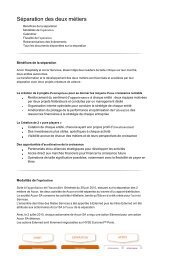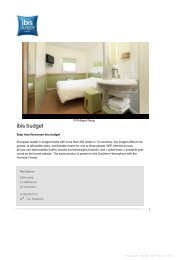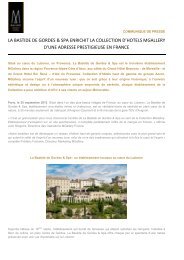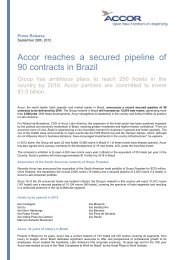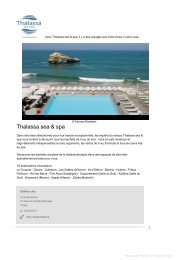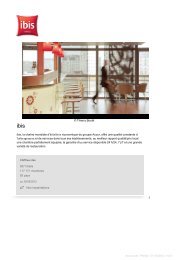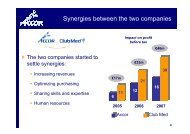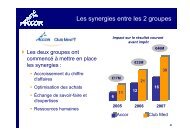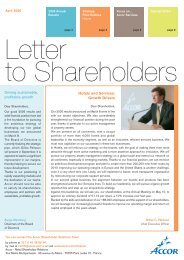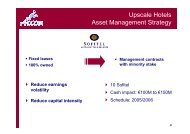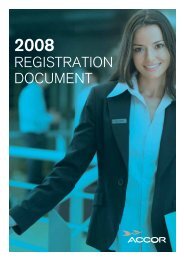SECTION 1 -
SECTION 1 -
SECTION 1 -
You also want an ePaper? Increase the reach of your titles
YUMPU automatically turns print PDFs into web optimized ePapers that Google loves.
Note 1. Summary of Significant Accounting Policies<br />
General framework<br />
164<br />
New Services: Historical Combined Financial Statements and Notes<br />
December, 31, 2009<br />
As required by European Commission regulation 1606/2002/EC dated July 19, 2002, the “Basis of Preparation” note above<br />
describes how the International Financial Reporting Standards (IFRSs) adopted by the European Union have been applied for the<br />
preparation of the historical combined financial statements at December 31, 2009. These historical combined financial<br />
statements include comparative financial information for 2008 and 2007, prepared in accordance with the same standards.<br />
New Services has prepared its financial statements for the year ended December 31, 2009 in accordance with IFRS 1 – First‐Time<br />
Adoption of International Financial Reporting Standards.<br />
When, as in the case of New Services, a subsidiary becomes a first‐time adopter after its parent, IFRS 1 stipulates that the<br />
carrying amounts of its assets and liabilities should be the same in both its own opening IFRS balance sheet and in its parent's<br />
consolidated balance sheet (except for adjustments for consolidation procedures). Alternatively, the subsidiary may measure all<br />
its assets or liabilities based on its own date of transition to IFRSs. In this latter case, the options applied by the subsidiary under<br />
IFRS 1 may be different from those applied by its parent.<br />
New Services has chosen to prepare its opening IFRS financial statements based on the carrying amounts of its assets and<br />
liabilities in Accor's consolidated balance sheet (except for adjustments for consolidation procedures). Consequently, New<br />
Services has selected the same options under IFRS 1 as those applied by the Accor Group.<br />
The following transitional provisions of IFRS 1 have been applied on first‐time adoption of IFRSs:<br />
o Business combinations: Business combinations recorded prior to January 1, 2004 – the date of the Accor Group's<br />
transition to IFRS – have not been restated.<br />
o Cumulative translation differences: New Services' cumulative translation differences were reset to zero by adjusting<br />
retained earnings in the Accor Group's opening balance sheet at the IFRS transition date. Consequently, the translation<br />
reserve included in equity corresponds to cumulative translation differences for the period from January 1, 2004.<br />
o Financial instruments: New Services' financial instruments were designated as either financial assets at fair value<br />
through profit or loss or available‐for‐sale financial assets at the date of the Accor Group's transition to IFRS.<br />
The following exemptions from other IFRSs were not applied in the opening balance sheet at the IFRS transition date:<br />
o Property, plant and equipment and intangible assets were not measured at fair value at the transition date.<br />
o IFRS 2 was not applied to equity instruments granted before November 7, 2002 or to equity instruments granted after<br />
November 7, 2002 that had not vested at January 1, 2005.<br />
Currently applicable standards, amendments and interpretations<br />
At December 31, 2009, the accounting standards and interpretations adopted by the European Union were the same as<br />
International Financial Reporting Standards (including IFRSs, IASs and SIC and IFRIC Interpretations) published by the<br />
International Accounting Standards Board (“IASB”) and applicable at that date, with the exception of:<br />
o IAS 39, which was only partially adopted.<br />
o IFRIC 12 – Service Concession Arrangements, which is applicable for annual periods beginning after March 29, 2009.<br />
o IFRIC 15 – Agreements for the Construction of Real Estate, which is applicable for annual periods beginning after<br />
December 31, 2009.<br />
o IFRIC 16 – Hedge of a Net Investment in a Foreign Operation, which is applicable for annual periods beginning after<br />
June 30, 2009.<br />
o IFRIC 18 – Transfers of Assets from Customers, which is applicable for annual periods beginning after October 31, 2009.<br />
These differences between the standards and interpretations published by the IASB and those adopted by the European Union<br />
do not have a material impact on New Services' financial statements because application of this Standard and these<br />
Interpretations will have no impact on the Group’s financial statements when they are adopted by the European Union and<br />
become applicable by the Group.<br />
Consequently, New Services' financial statements have been prepared in accordance with International Financing Reporting<br />
Standards as published by the IASB.<br />
The following new standards, amendments to or revisions of existing standards and interpretations had been adopted by the<br />
European Union and were applicable from January 1, 2009:



